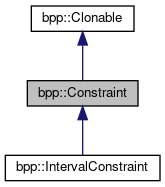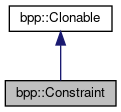The constraint interface. More...
#include <Bpp/Numeric/Constraints.h>
 Inheritance diagram for bpp::Constraint:
Inheritance diagram for bpp::Constraint: Collaboration diagram for bpp::Constraint:
Collaboration diagram for bpp::Constraint:Public Member Functions | |
| Constraint () | |
| virtual | ~Constraint () |
| Constraint * | clone () const =0 |
| Create a copy of this object and send a pointer to it. More... | |
| virtual bool | isCorrect (double value) const =0 |
| Tell if a given value is correct. More... | |
| virtual bool | includes (double min, double max) const =0 |
| Tell if all the values in a given interval are correct. More... | |
| virtual double | getLimit (double value) const =0 |
| Give the nearest limit for a bad value. More... | |
| virtual double | getAcceptedLimit (double value) const =0 |
| Give the nearest accepted limit for a bad value. More... | |
| virtual std::string | getDescription () const =0 |
| Give a short description on the type of constraint. More... | |
| virtual Constraint * | operator & (const Constraint &c) const =0 |
| Intersect this Constraint with another one. More... | |
| virtual bool | isEmpty () const =0 |
| Tells if this constraints defines an empty set. More... | |
Detailed Description
The constraint interface.
It provides a method that tells if a given value is correct.
Definition at line 62 of file Constraints.h.
Constructor & Destructor Documentation
◆ Constraint()
|
inline |
Definition at line 65 of file Constraints.h.
◆ ~Constraint()
|
inlinevirtual |
Definition at line 66 of file Constraints.h.
Member Function Documentation
◆ clone()
|
pure virtual |
Create a copy of this object and send a pointer to it.
- Returns
- A pointer toward the copy object.
Implements bpp::Clonable.
Implemented in bpp::IntervalConstraint.
Referenced by bpp::Parameter::operator=(), and bpp::Parameter::Parameter().
◆ getAcceptedLimit()
|
pure virtual |
Give the nearest accepted limit for a bad value.
The difference with getLimit() is when the Constraint is open at the limit, in which case the retruned value is the limit +- 1e-12.
- Parameters
-
value The bad value.
- Returns
- The nearer limit.
Implemented in bpp::IntervalConstraint.
Referenced by bpp::BfgsMultiDimensions::doInit().
◆ getDescription()
|
pure virtual |
Give a short description on the type of constraint.
- Returns
- A string which describes the constraint.
Implemented in bpp::IntervalConstraint.
Referenced by bpp::AbstractParameterAliasable::aliasParameters(), and bpp::ReparametrizationFunctionWrapper::init_().
◆ getLimit()
|
pure virtual |
Give the nearest limit for a bad value.
- Parameters
-
value The bad value.
- Returns
- The nearer limit.
Implemented in bpp::IntervalConstraint.
◆ includes()
|
pure virtual |
Tell if all the values in a given interval are correct.
- Parameters
-
min,max The bounds of the interval.
- Returns
- True is the value is correct.
Implemented in bpp::IntervalConstraint.
◆ isCorrect()
|
pure virtual |
Tell if a given value is correct.
- Parameters
-
value The value to test.
- Returns
- True is the value is correct.
Implemented in bpp::IntervalConstraint.
Referenced by bpp::ParameterList::matchParametersValues(), bpp::InvariantMixedDiscreteDistribution::restrictToConstraint(), bpp::Parameter::setConstraint(), bpp::ParameterList::setParametersValues(), and bpp::ParameterList::testParametersValues().
◆ isEmpty()
|
pure virtual |
Tells if this constraints defines an empty set.
Implemented in bpp::IntervalConstraint.
◆ operator &()
|
pure virtual |
Intersect this Constraint with another one.
- Parameters
-
c the intersected Constraint
- Returns
- the intersection
Implemented in bpp::IntervalConstraint.
The documentation for this class was generated from the following file:
- Bpp/Numeric/Constraints.h


